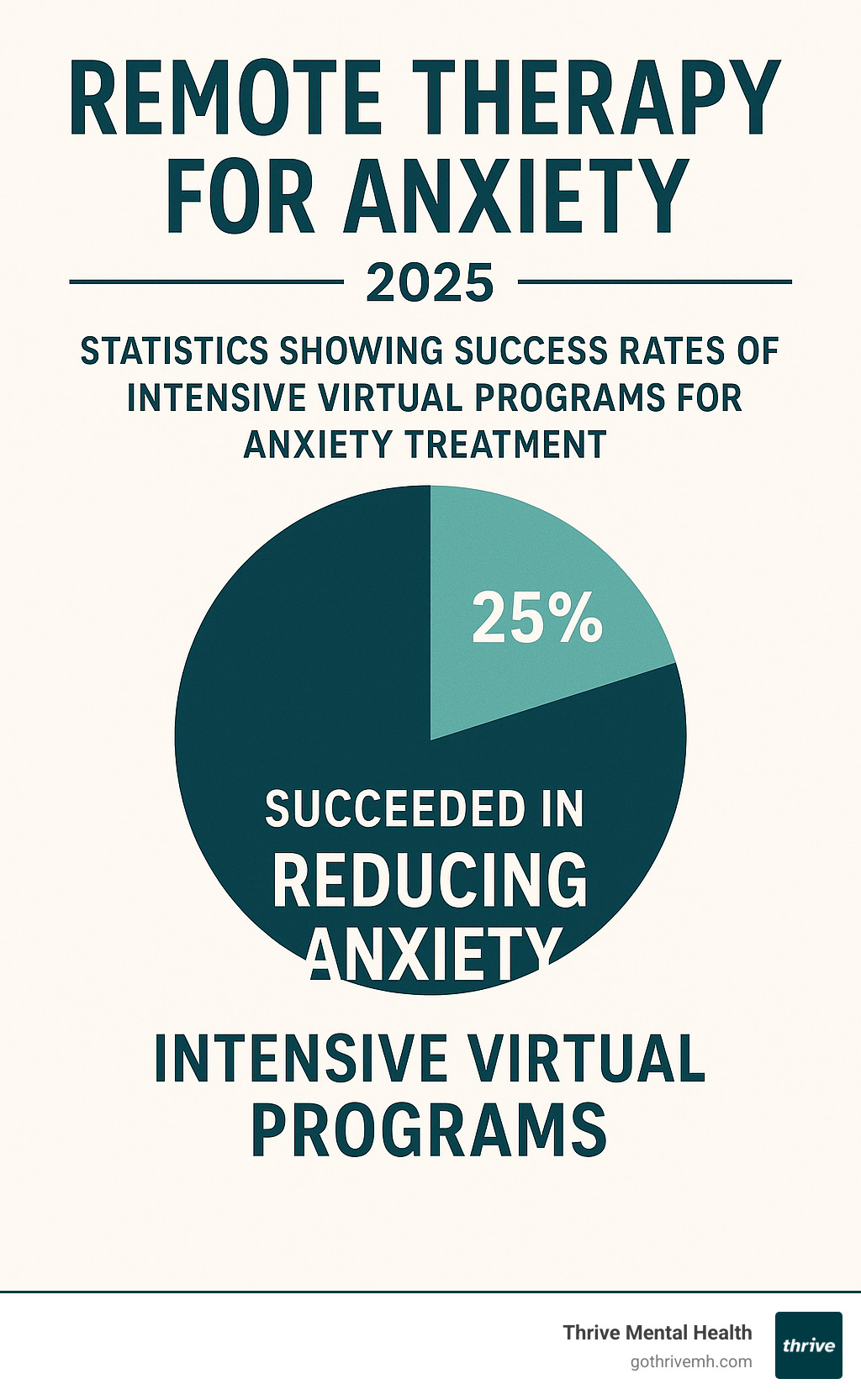No Stress Zone: Tackling Anxiety with Remote Therapy

Why Remote Therapy for Anxiety is Changing Mental Health Care
Remote therapy for anxiety gives busy adults access to evidence-based help without the travel, scheduling headaches, or waiting-room stress of traditional care. Research shows that about 80 % of clients rate virtual sessions as effective as in-person treatment, and nearly everyone (98 %) finds them more convenient.
Key benefits:
- Accessibility from any private space
- Flexible evening / weekend scheduling
- No commute or parking costs
- Reduced stigma—no shared waiting room
- Often lower fees than office visits
- Familiar surroundings that ease nerves
Avoidance is a core feature of anxiety. When even driving to an office feels overwhelming, telehealth removes the biggest barrier to starting treatment.
The pandemic fast-tracked telehealth, and the outcomes hold up: internet-delivered Cognitive Behavioral Therapy (CBT) keeps 91 % of panic-disorder patients panic-free six months later, and 70 % of users see noticeable relief within three months.
Remote therapy isn’t a second-best option—it’s simply a different path to the same clinical results, delivered in a way that fits modern life.
Is Online Therapy as Effective as Meeting in Person?
A meta-analysis of live video therapy found no meaningful difference between virtual and office-based sessions across thousands of patients. In short, the screen doesn’t blunt the healing power of therapy.
For people whose anxiety makes leaving home stressful, connecting from a couch or home office can actually boost engagement. In Thrive Mental Health’s programs—and across the wider research base—roughly 70 % of clients report symptom improvement within 12 weeks, and 91 % of those treated for panic remain panic-free at follow-up.
Key Benefits of Remote Therapy for Anxiety

- Your home becomes a safe therapeutic space.
- Triggers like traffic, parking, or public waiting rooms disappear.
- Geography is irrelevant—you can keep sessions while traveling or on work breaks.
- Evening and weekend slots are easier to book.
- Privacy is higher—no chance of bumping into a colleague.
When In-Person Care May Be Better
Remote therapy is ideal for most mild-to-moderate anxiety, but in-office treatment may be safer if you:
- Need medical monitoring for active self-harm thoughts, severe substance use, or eating disorders.
- Lack reliable internet or feel uncomfortable on video.
- Are in acute crisis and require immediate, local resources.
Thrive Mental Health offers a hybrid option so clients can move between formats as needs change while still receiving seamless care.
How Remote Therapy for Anxiety Works: Modalities and Process

Getting started is simpler than you might expect:
- Initial assessment – a 45-minute video call to discuss symptoms, triggers, and goals.
- Provider matching – you’re paired with a licensed clinician experienced in anxiety care.
- Tech check – a quick sound / camera test; most platforms run on any smartphone or laptop.
- First session – set goals and design a treatment plan.
- Ongoing care – weekly or twice-weekly meetings, plus between-session exercises.
Therapy Formats Available Remotely
- Video sessions (most common)
- Phone sessions (great for low bandwidth or camera shyness)
- Secure messaging for brief check-ins
Structured approaches translate well online, especially Cognitive Behavioral Therapy (CBT)—widely considered the gold standard for anxiety. DBT, ACT, exposure therapy, and mindfulness-based work also adapt effectively to video.
Anxiety Conditions Treated Online
Remote CBT and related methods successfully address:
- Generalized Anxiety Disorder (GAD)
- Panic Disorder
- Social Anxiety Disorder
- Specific Phobias
- Obsessive-Compulsive Disorder (OCD)
- Post-Traumatic Stress Disorder (PTSD)
For clients who need more support, Thrive’s virtual IOP programs add group therapy, skills classes, and psychiatric oversight without sacrificing flexibility.
Navigating the Practical Side: Costs, Insurance, and Finding a Qualified Therapist

Insurance Coverage
Most major plans now reimburse remote therapy for anxiety exactly as they do in-person care. Call the number on your card and ask:
- Is telehealth for mental health covered?
- What’s my copay or coinsurance?
- Do I need a referral?
If you prefer to self-pay, typical rates run $65–$150 per session, often less than brick-and-mortar offices because clinicians have lower overhead.
Finding the Right Provider
- Confirm they’re licensed in the state where you’ll physically sit during sessions.
- Look for anxiety specialization and prior telehealth experience.
- Request a brief consultation—fit matters. If it doesn’t feel right after a couple of meetings, switch.
Therapy vs. Psychiatry: Quick Guide
| Therapist (LCSW, LPC, Psychologist) | Psychiatrist (MD/DO) | |
|---|---|---|
| Primary focus | Talk therapy, coping skills | Medication management |
| Session length | 45–60 min | 15–30 min |
| Prescribes meds | No | Yes |
| Best for | Mild–moderate symptoms, skills | Severe symptoms, med review |
Many Thrive clients use both services, meeting weekly with a therapist and monthly with a psychiatrist—all online.
Making the Most of Your Virtual Sessions
Creating the right environment maximizes results.
Practical Tips
- Choose a private, consistent space (bedroom, study, parked car).
- Test your camera, mic, and internet beforehand; keep your therapist’s phone number as backup.
- Place a lamp behind your screen so your face is visible.
- Silence notifications and let others know you’re unavailable.
- Bring notes on recent triggers and practice assignments.
- After each session, spend 10 minutes journaling or walking to let insights settle.
When Weekly Sessions Aren’t Enough
Thrive’s virtual Intensive Outpatient Program offers multiple therapy hours each week—individual, group, and skills training—scheduled around work commitments. Need still more structure? Our Partial Hospitalization Program (PHP) provides daily support with medical oversight, all via secure video.

Frequently Asked Questions about Remote Anxiety Therapy
How do I know if remote therapy is right for me?
It’s probably a good fit if you:
- Can handle basic video-call tech.
- Have a quiet, private spot.
- Experience mild to moderate anxiety that doesn’t require emergency care.
A brief consultation will confirm whether telehealth or in-person care (or a mix) makes most sense.
What if I don’t click with my therapist?
Give it two or three sessions, then speak up. Most issues resolve with honest feedback, and switching providers is easy if needed—no hard feelings.
What should I do in a crisis?
Remote therapy isn’t a crisis service. If you might harm yourself or others, call 911 or go to the nearest ER. You can also dial 988 (Suicide & Crisis Lifeline) or text HOME to 741741 for the Crisis Text Line. Work with your therapist to draft a personal safety plan during non-crisis times.
Conclusion: Your Path to a Calmer Mind Starts Here
Taking the first step toward managing your anxiety doesn’t have to feel overwhelming. Remote therapy for anxiety has opened doors for thousands of people who previously couldn’t access the help they needed – and you could be next.
The evidence speaks volumes: 80% of people find online therapy just as effective as sitting across from a therapist in an office. But here’s what makes it even better – you get all that effectiveness while staying in your pajamas if you want to. No rushing through traffic, no awkward waiting rooms, no scheduling gymnastics around your already packed life.
At Thrive Mental Health, we’ve watched busy professionals transform their relationship with anxiety through our virtual programs. The executive who couldn’t leave work for weekly appointments but thrived in evening sessions from her home office. The young professional who felt too embarrassed to walk into a therapy office but opened up beautifully over video calls. The parent who finally got help because they could attend sessions after the kids went to bed.
What we’ve learned is simple: when you remove the barriers to getting help, amazing things happen. Your anxiety doesn’t have to control your schedule, your career, or your life anymore.
Whether you’re dealing with generalized anxiety, panic attacks, social anxiety, or workplace stress, the right support is available right where you are. Our flexible approach means you can access evidence-based care whether you need weekly therapy sessions or more intensive support through our virtual IOP programs.
The beauty of starting today is that you don’t need to have everything figured out. You don’t need to clear your entire calendar or explain to your boss why you’re leaving early every Tuesday. You just need to be ready to feel better.
Your journey to a calmer mind might begin with a simple video call from your living room. It might start with learning why your brain creates those anxious thoughts and how to respond differently. It might involve connecting with others who understand exactly what you’re going through in our group programs.
Here’s what we know for sure: seeking help for anxiety isn’t a sign that something’s wrong with you. It’s a sign that you’re ready to take control of your mental health and create the life you want. That takes courage, and you’ve already shown you have it by reading this far.
Virtual therapy offers a convenient and effective approach to counseling that meets you where you are – literally and figuratively. Whether you’re in Tampa Bay, St. Petersburg, or anywhere in Central Florida, the same high-quality care is available with a few clicks.
Your future self – the one who feels calm during presentations, who doesn’t lie awake at night worrying, who can enjoy social events without that familiar knot in their stomach – is waiting for you to take this step.
At Thrive Mental Health, we’re here to make that journey as smooth as possible. Our expert-led, evidence-based care is designed around your life, not the other way around. Because when getting help is convenient and comfortable, you’re much more likely to stick with it and see real results.
The path to managing your anxiety starts with a single decision. You’ve already taken the time to learn about your options. Now it’s time to choose the one that fits your life and your goals. Your calmer, more confident future is just a conversation away.